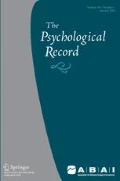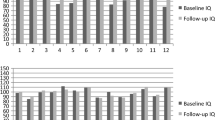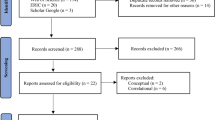Abstract
A growing consensus is that performances on standardized intelligence tests can be positively influenced by interventions that focus on improving relational reasoning. One such intervention, known as SMART (Strengthening Mental Abilities with Relational Training), consists of presenting participants with increasingly complex exemplars of relational reasoning tasks involving premises associated along same-as, opposite-of, more-than, and less-than relations. Following multiple training and testing sessions involving these relations, increased fluency in SMART is related to enhanced performances on tests of intellectual ability (Cassidy et al., 2016). The current study expands upon previous investigations on SMART in two ways. First, we explored whether the amount of training undertaken can predict changes in intelligence test performances. Second, we assessed whether SMART training could be effective for a non-English speaking, socioeconomically disadvantaged cohort. Changes in intelligence were assessed via administrations of the standard Raven’s Progressive Matrices before and after SMART training. Our results show that the stage of SMART training completed is positively related to changes in Ravens’ performances and that such training can be effective for non-English cohorts.


Similar content being viewed by others
Notes
The second author is part owner of www.RaiseYourIQ.com, which commercially provides SMART training. We have reported this conflict of interest to the editor.
Our cohort was unfamiliar with English and had to be trained along the meaning of the relational terms ‘More, Less, Same’ and ‘Opposite’, as well as the feedback terms ‘Correct’ and ‘Wrong’.
Children were pre-trained to derive relations of sameness, opposition and comparison using real objects (two pencils, sheet of paper, two pens, eraser) in the Bengali language. These pre-training trials would involve presenting two objects (e.g., pencil-1, paper) and a cue (the words “OPPOSITE OF” on a sheet of paper) in left to right object>cue>object sequences (e.g., pencil-1 > SAME AS>pen-2, pen-2 > OPPOSITE OF>paper). This would be followed by a test sequence (e.g., pencil-1 > OPPOSITE OF>paper) and the question as to whether the test sequence was correct. If Ss could successfully derive relations five SAME/OPPOSITE and five MORE/LESS relations, pre-training was terminated.
References
Adey, P., Csapó, B., Demetriou, A., Hautamäki, J., & Shayer, M. (2007). Can we be intelligent about intelligence? Why education needs the concept of plastic general ability. Educational Research Review, 2(2), 75–97. https://doi.org/10.1016/j.edurev.2007.05.001.
Ainscow, M. (2005). Developing inclusive education systems: What are the levers for change? Journal of Educational Change, 6(2), 109–124. https://doi.org/10.1007/s10833-005-1298-4.
Amd, M., & Roche, B. (2016). A derived transformation of emotional functions using self-reports, implicit association tests, and frontal alpha asymmetries. Learning & Behavior, 44(2), 175–190. https://doi.org/10.3758/s13420-015-0198-6.
Bakhiet, S., Haseeb, B., Seddieg, I., Cheng, H., & Lynn, R. (2015). Sex differences on raven's standard progressive matrices among 6 to 18 year olds in Sudan. Intelligence, 50, 10–13. https://doi.org/10.1016/j.intell.2015.01.013.
Blackledge, J. T. (2003). An introduction to relational frame theory: Basics and applications. The Behavior Analyst Today, 3(4), 421–433. https://doi.org/10.1037/h0099997.
Burns, G. L., & Staats, A. W. (1981). Intelligence and child development: What intelligence is and how it is learned and functions. Genetic Psychology Monographs, 104(2), 237–301.
Button, K. S., Ioannidis, J. P. A., Mokrysz, C., Nosek, B. A., Flint, J., Robinson, E. S. J., & Munafò, M. R. (2013). Power failure: Why small sample size undermines the reliability of neuroscience. Nature Reviews Neuroscience, 14(5), 365–376. https://doi.org/10.1038/nrn3475.
Carpenter, P. A., Just, M. A., & Shell, P. (1990). What one intelligence test measures: A theoretical account of the processing in the raven progressive matrices test. Psychological Review, 97(3), 404–431. https://doi.org/10.1037/0033-295X.97.3.404.
Cassidy, S., Roche, B., Colbert, D., Stewart, I., & Grey, I. M. (2016). A relational frame skills training intervention to increase general intelligence and scholastic aptitude. Learning and Individual Differences, 47, 222–235. https://doi.org/10.1016/j.lindif.2016.03.001.
Cassidy, S., Roche, B., & Hayes, S. C. (2011). A relational frame training intervention to raise intelligence quotients: A pilot study. The Psychological Record, 61(2), 173–198.
Cassidy, S., Roche, B., & O'Hora, D. (2010). Relational frame theory and human intelligence. European Journal of Behavior Analysis, 11(1), 37–51. https://doi.org/10.1080/15021149.2010.11434333.
Cattell, R. B. (1963). Theory of fluid and crystallized intelligence: A critical experiment. Journal of Educational Psychology, 54(1), 1–22. https://doi.org/10.1037/h0046743.
Cockcroft, K., Alloway, T., Copello, E., & Milligan, R. (2015). A cross-cultural comparison between south african and british students on the wechsler adult intelligence scales third edition (WAIS-III). Frontiers in Psychology, 6, 297. https://doi.org/10.3389/fpsyg.2015.00297.
Daley, T. C., Whaley, S. E., Sigman, M. D., Espinosa, M. P., & Neumann, C. (2003). IQ on the rise: The flynn effect in rural kenyan children. Psychological Science, 14(3), 215–219. https://doi.org/10.1111/1467-9280.02434.
Di Fabio, A., & Saklofske, D. (2014). Comparing ability and self-report trait emotional intelligence, fluid intelligence, and personality traits in career decision. Personality and Individual Differences, 64, 174–178. https://doi.org/10.1016/j.paid.2014.02.024.
Dixon, M., Whiting, S., Rowsey, K., & Belisly, J. (2014). Assessing the relationship between intelligence and the PEAK relational training system. Research in Autism Spectrum Disorders, 8(9), 1208–1213. https://doi.org/10.1016/j.rasd.2014.05.005.
Dunn, O. J. (1964). Multiple comparisons using rank sums. Technometrics, 6(3), 241-252
Faul, F., Erdfelder, E., Lang, A., & Buchner, A. (2007). GPower 3: A flexible statistical power analysis program for the social, behavioral, and biomedical sciences. Behavior Research Methods, 39(2), 175–191. https://doi.org/10.3758/BF03193146.
Fox, M. C., & Charness, N. (2010). How to gain eleven IQ points in ten minutes: Thinking aloud improves raven's matrices performance in older adults. Aging, Neuropsychology, and Cognition, 17(2), 191–204. https://doi.org/10.1080/13825580903042668.
Hayes, S. C., Barnes-Holmes, D., & Roche, B. (2001). Relational frame theory: A post-skinnerian account of human language and cognition. New York: Kluwer Academic/Plenum Publishers.
Hayes, T., Petrov, A., & Sederberg, P. (2015). Do we really become smarter when our fluid-intelligence test scores improve? Intelligence, 48, 1–14. https://doi.org/10.1016/j.intell.2014.10.005.
Hayes, J., & Stewart, I. (2016). Comparing the effects of derived relational training and computer coding on intellectual potential in school-age children. British Journal of Educational Psychology, 86(3), 397–411. https://doi.org/10.1111/bjep.12114.
Jäeggi, S. M., Buschkuehl, M., Jonides, J., & Shah, P. (2011). Short- and long-term benefits of cognitive training. Proceedings of the National Academy of Science, 108(25), 10081–10086. https://doi.org/10.1073/pnas.1103228108.
Lovaas, O. I. (1987). Behavioral treatment and normal educational and intellectual functioning in young autistic children. Journal of Consulting and Clinical Psychology, 55(1), 3–9. https://doi.org/10.1037/0022-006X.55.1.3.
Mackintosh, N. J., & Bennett, E. S. (2005). What do raven's matrices measure? An analysis in terms of sex differences. Intelligence, 33(6), 663–674. https://doi.org/10.1016/j.intell.2005.03.004.
McIlvane, W. J., & Dube, W. V. (2003). Stimulus control topography coherence theory: Foundations and extensions. The Behavior Analyst, 26(2), 195–213.
Miele, F. (1979). Cultural bias in the WISC. Intelligence, 3(2), 149–163. https://doi.org/10.1016/0160-2896(79)90013-8.
Moran, A. P. (1986). The reliability and validity of raven's standard progressive matrices for irish apprentices. Applied Psychology, 35(4), 533–538. https://doi.org/10.1111/j.1464-0597.1986.tb00955.x.
Moran, L., Stewart, I., McElwee, J., & Ming, S. (2010). Brief report: The training and assessment of relational precursors and abilities (TARPA): A preliminary analysis. Journal of Autism and Developmental Disorders, 40(9), 1149–1153. https://doi.org/10.1007/s10803-010-0968-0.
Naskar, S. K., & Bandyopadhyay, S. (2006). Handling of prepositions in English to Bengali machine translation. In Proceedings of the Third ACL-SIGSEM Workshop on Prepositions (pp. 89–94). Association for Computational Linguistics, Trento, Italy, April 6. East Stroudsburg, PA.
O'Toole, C., Barnes-Holmes, D., Murphy, C., O'Connor, J., & Barnes-Holmes, Y. (2009). Relational flexibility and human intelligence: Extending the remit of skinner's verbal behavior. International Journal of Psychology and Psychological Therapy, 9(1), 1–17.
Owen, K. (1992). The suitability of raven's standard progressive matrices for various groups in south africa. Personality and Individual Differences, 13(2), 149–159. https://doi.org/10.1016/0191-8869(92)90037-P.
Parra, I., & Ruiz, F. J. (2016). The effect on intelligence quotient of training fluency in relational frames of coordination. International Journal of Psychology and Psychological Therapy, 16(1), 1–12.
Raven, J. (2000). The raven's progressive matrices: Change and stability over culture and time. Cognitive Psychology, 41(1), 1–48. https://doi.org/10.1006/cogp.1999.0735.
Raven, J. C., & Court, J. H. (1993). Manual for raven progressive matrices and vocabulary scales by JC raven, JH court and J. Raven; section 2; Coloured progressive matrices. Oxford: Psychologist Press.
Roche, B., Cassidy, S., & Stewart, I. (2013). Nurturing genius: Using relational frame theory to address a foundational aim of psychology. In T. Kashdan & J. Ciarrochi (Eds.), Cultivating well-being: Treatment innovations in positive psychology, acceptance and commitment therapy, and beyond (pp. 267–302). Oakland, CA: New Harbinger.
Rohde, T. E., & Thompson, L. A. (2007). Predicting academic achievement with cognitive ability. Intelligence, 35(1), 83–92. https://doi.org/10.1016/j.intell.2006.05.004.
Ruud, A. E. (2015). Five scenarios for Bangladesh. Retrieved from http://archive.dhakatribune.com/long-form/2015/feb/24/five-scenarios-bangladesh.
Sefcek, J. A., Miller, G. F., & Figueredo, A. J. (2016). Development and validation of an 18-item medium form of the ravens advanced progressive matrices. SAGE Open, 6(2), 215824401665191. https://doi.org/10.1177/2158244016651915.
Smoke, K. L. (1932). An objective study of concept formation. Psychological Monographs, 42(4), i-46. https://doi.org/10.1037/h0093297.
Staats, A. W. (1971). Child learning, intelligence, and personality: Principles of a behavioral interaction approach. New York, NY: Harper & Row.
Staats, A. W. (2012). The marvelous learning animal: What makes human behavior unique. Amherst, NY: Prometheus Books.
Sternberg, R. J. (1988). The raising of intelligence: A selected history of attempts to raise retarded intelligence. University of Illinois Press., 101, 142. https://doi.org/10.2307/1422800.
Sternberg, R. J. (2008). Increasing fluid intelligence is possible after all. Proceedings of the National Academy of Science, 105, 6791–6792. https://doi.org/10.1073/pnas.0803396105.
te Nijenhuis, J., Bakhiet, S. F., van den Hoek, M., Repko, J., Allik, J., Žebec, M. S., Sukhanovskiy, V., & Abduljabbar, A. S. (2016). Spearman's hypothesis tested comparing sudanese children and adolescents with various other groups of children and adolescents on the items of the standard progressive matrices. Intelligence, 56, 46–57. https://doi.org/10.1016/j.intell.2016.02.010.
Thirus, J., Starbrink, M., & Jansson, B. (2016). Relational frame theory, mathematical and logical skills: A multiple exemplar training intervention to enhance intellectual performance. International Journal of Psychology and Psychological Therapy, 16(2), 141–155.
Valencia, R. R. (1984). Reliability of the raven coloured progressive matrices for anglo and for Mexican-American children. Psychology in the Schools, 21(1), 49–52. https://doi.org/10.1002/1520-6807(198401)21:1<49::AID-PITS2310210109>3.0.CO;2-H.
Vizcaino-Torres, R., Ruiz, F., Luciano, C., Lopez-Lopez, J., Barbero-Rubio, A., & Gil, E. (2015). The effect of relational training on intelligence quotient: A case study. Psicothema, 27(2), 120–127. https://doi.org/10.7334/psicothema2014.149.
Acknowledgements
The authors thank Mr. Korvi Rakshand and the JAAGO school staff for their assistance and patience, without whom the current work would not have been possible.
Funding
Preparation of this manuscript was funded in part by grant # 2015/24159-4 from the Sao Paulo Research foundation (FAPESP), as well as from the the Irish Research Council (IRC), to the first author.
Author information
Authors and Affiliations
Corresponding author
Ethics declarations
The current research complied with the ethical and child protection guidelines set forth by the Federal University of Sao Carlos.
Conflict of Interest
In accordance with Springer policy and our ethical obligation as researchers, we declare that the second author is a co-founder, scientific advisor and shareholder of www.RaiseYourIQ.com, which commercially distributes the SMART behavioral intervention examined in the current study. This potential conflict of interest has been disclosed fully to the Editor.
Rights and permissions
About this article
Cite this article
Amd, M., Roche, B. Assessing the Effects of a Relational Training Intervention on Fluid Intelligence Among a Sample of Socially Disadvantaged Children in Bangladesh. Psychol Rec 68, 141–149 (2018). https://doi.org/10.1007/s40732-018-0273-4
Published:
Issue Date:
DOI: https://doi.org/10.1007/s40732-018-0273-4




